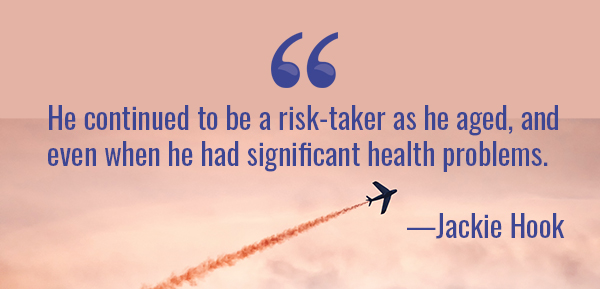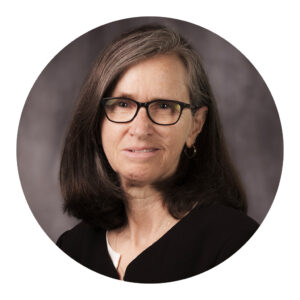Home > Breaking Through Anger Barriers
Breaking Through Anger Barriers
by Jackie Hook
In the early 1950s, my dad was a fighter-bomber pilot in the Air Force and primarily flew F-86s while stationed at Langley Air Force Base in Hampton, Virginia. Back then, breaking the sound barrier was a relatively new, and dangerous, phenomenon. The first aircraft to do it, the Bell X-1, had accomplished the feat on October 14, 1947.
Although F-86s were considered to be slightly underpowered, early versions could be flown supersonically—with some risk. To do so required Dad to fly his jet to around 40,000 feet, turn it nose-down toward the earth, and fly it at full throttle until he broke the sound barrier. Dad was a risk-taker.

He continued to be a risk-taker as he aged, and even when he had significant health problems. Though these health problems suggested interventions that could come with potential complications, he decided to get a pacemaker when he was 92 years old and had a heart catheterization and aortic valve replacement at the age of 93.
When Dad fell, broke two ribs, and had internal bleeding on January 27, 2024, at 93.5 years of age (those half years were important to him), he wanted to do everything he could to heal and get back to the life he loved.
That “doing everything he could” included three trips to a trauma center, twice by helicopter. I was with him each step of the way, and I had conversations with him about death. Dad recognized that death might be getting closer, but he wanted to keep fighting, so I advocated for him.
As my dad’s advocate, I took lots of notes to keep track of his health care. But on the second trip to the trauma center, I stopped my note-taking. It wasn’t a conscious decision; I just stopped.
The conversations with the medical staff on this second trip were about Dad’s healing. After they released him and we got him back to my parents’ continuing care retirement community (CCRC), it was time for rehabilitation. Dad was tired and not hungry. He used all the strength he had to do what he was asked to meet the requirements for improvement. And then he rested and politely suggested to the physical therapy staff that they come back the next day. The focus continued to be on his healing.
I had my end-of-life doula hat on some of the time and wondered where we were on Dad’s journey, but when I asked about comfort care, the medical staff wasn’t on board and neither was Dad, so I tried to hold onto hope.
When he was life-flighted to the trauma center for a third time, things shifted. It was a sharp pivot from the professionals helping Dad heal to them saying this is Dad’s body shutting down and we’ve done everything we can. Even though I think a part of me had suspected this for a while, it was an abrupt change. My dad and I talked about his situation and he seemed to accept it.
We got Dad back to the skilled nursing section of the CCRC with hospice on board on Tuesday, March 5. He was pretty tired the next day and rested. Two days later, I was in a work meeting and my mom called to say my dad was wondering when I was going to come to visit. I went over and the three of us had a meaningful time together. We sat and chatted, we sat in silence, and my daughter called and joined the conversation. Dad said twice, “Thank you both. This was a really nice day.”
His dinner arrived and there was a palpable shift in Dad. Both Mom and I noticed. We didn’t know what was coming next—and it turned out I wasn’t prepared for it.
Dad got angry. His body wouldn’t do what he wanted it to, and he was mad. My mom and I tried to explain what was happening, but that only frustrated him more. The nurses changed his medication, and that didn’t help either. It was a very long night with little sleep for any of us.
I knew in my head that anger could be one of the emotions of the dying process. Even Elisabeth Kübler-Ross documented it in her study of dying people. And it made sense that my dad was feeling angry. He was a fighter, and he knew there was nothing more he could do; he was dying, and that made him angry. So why was I unprepared for his anger?
I think I was unprepared for a couple of reasons. First, as I said, Dad was a risk-taker and we’d had conversations about death. Therefore, I thought he’d be ready to die. But I learned that risk-taking is very different from dying. Dad was a fighter who fought and took risks to keep his life. He didn’t want to leave it. He was dying just as he had lived, as a fighter. I didn’t expect that.
Second, I think I was unprepared because I’m uncomfortable with anger. Intellectually I recognize that there are no good or bad emotions, but anger is one I struggle with in myself and others. I don’t like to express my own anger, and I often take others’ anger personally. When anger is directed at me, I recoil.
Dad worked through his anger before he died on March 12. I’m still learning from mine. If I had that long, sleepless night to do over again, I would have tried getting angry with dying right along with Dad. Instead, I can feel him encouraging me to break my anger barriers in a healthy way. I am a work in progress.

AUTHOR BIO
Jackie Naginey Hook is a spiritual director, celebrant, and end-of-life doula. She coordinates the Helping Grieving Hearts Heal program through Koch Funeral Home in State College, Pennsylvania. Jackie can be reached at [email protected].
